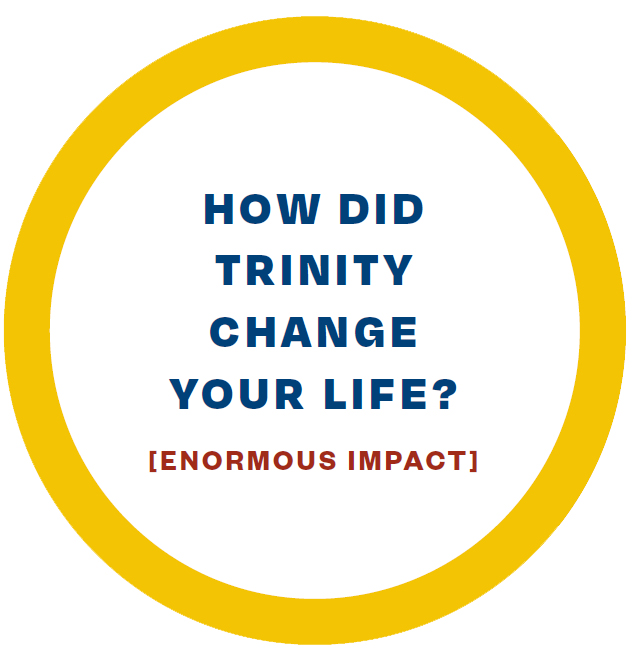Bantams speak
Results show confidence in relevance of Trinity’s mission, overall enthusiasm
Editor’s note: Trinity Vice President for Advancement Michael Casey, the primary source for this story, unexpectedly passed away on August 22, just before this issue’s deadline. The College deeply mourns his loss and will remember him fondly through his work and legacy; a full obituary will be included in the winter 2024 issue of the magazine.
By Hellen Hom-Diamond
Trinity College alumni have been described as passionate and proud. Bantams speak energetically about classmates, the College, and their own personal beliefs. They are not shy about showing their enthusiasm at games or supporting undergraduates through internships or career advice. This reputation is once again supported by data.
The Reporter featured results of an earlier alumni survey in the fall 2018 issue. Now the results of the 2022 survey are in.
“It was important for us to assess how our alumni are feeling and the depth of their relationship with Trinity, using the 2018 data as benchmarks,” says Vice President for Advancement Michael Casey, who commissioned the survey that repeated questions from 2018 to measure growth in certain areas and added questions about preferences in communication and engagement to establish new metrics. In preparation for the Bicentennial celebration, the survey also included questions about preferences on ways to participate and celebrate the historic milestone. Here is what we learned.
Remarkable Response
Resonance Insights—the firm that designed and delivered the 2018 survey results—returned in 2022 to measure the attitudes of alumni. As was the case in 2018, Resonance reported an exceptionally high response rate. Of the 15,500 surveys successfully delivered, 2,200 alumni responded, providing strong statistical significance. Although not as high as 2018’s record-setting level (17 percent), 2022’s response rate (14 percent) remained high.
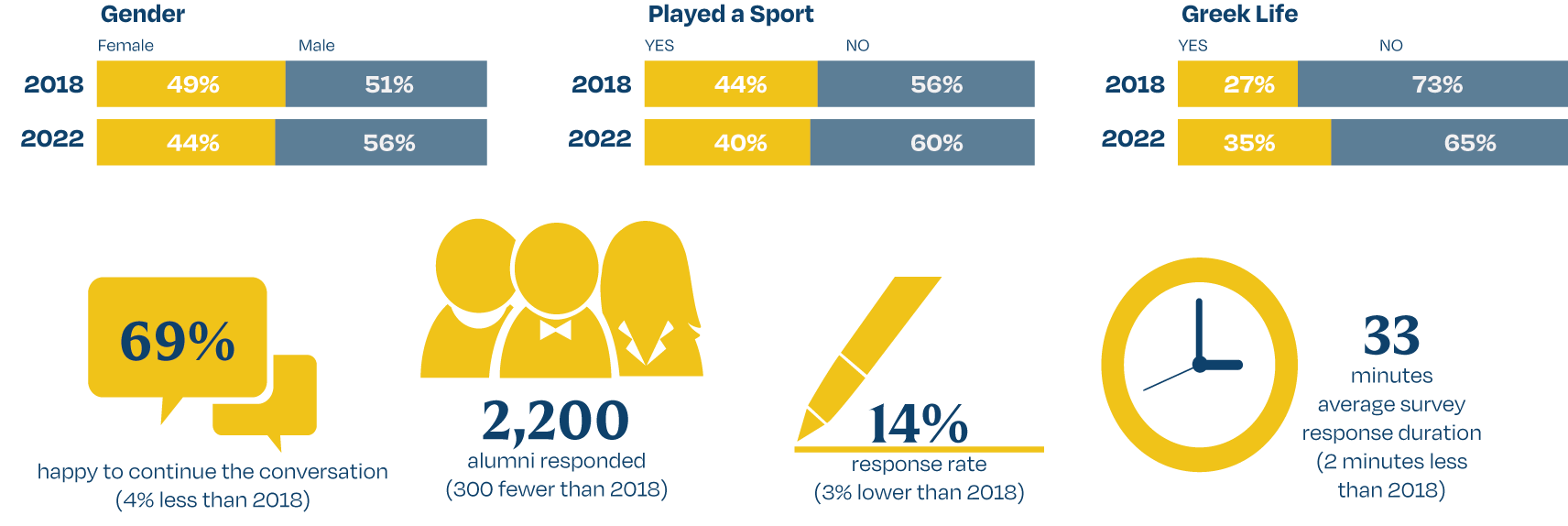
Steve Gang, who led the Resonance team, says, “I have conducted many surveys across higher ed and in the corporate sector in more than 25 years in research. For a college like Trinity, a response rate of 6 percent is the average, and 10 percent would be great. Your alums have once again broken records for your peer group. And it wasn’t just the same folks from 2018—fewer than 25 percent of 2022 respondents had responded in 2018. That’s a striking result that tells us that even more Trinity alumni want their voices to be heard.”
How Alumni Are Feeling
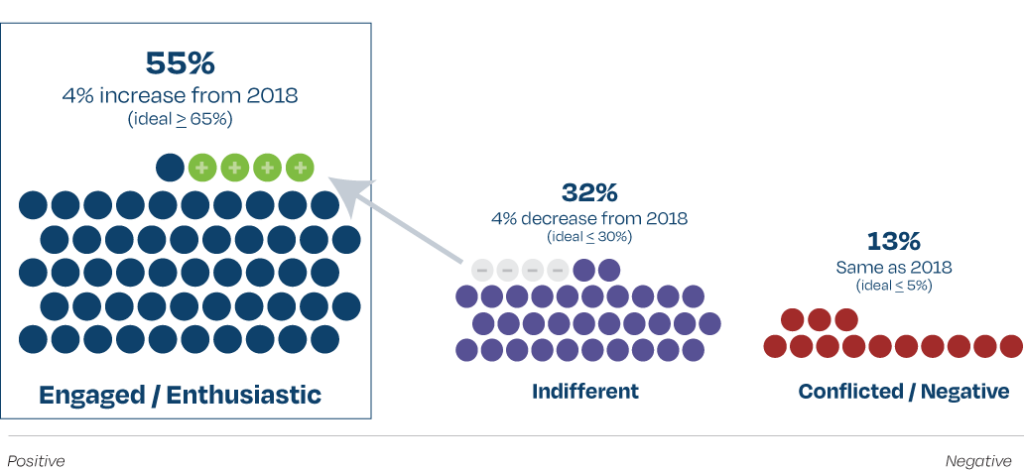
The survey included 40 conventional questions about demographics, attitudes, and behaviors, plus several exercises to evoke more spontaneous sentiments and explanations. Alumni contributed more than 15,000 written comments that shed light on attitudes about the current and ideal alumni experience.
Gang says that perhaps the most telling change from 2018 to 2022 was the uptick in positive attitudes. This was most clearly signaled by the movement of 7.8 percent of alumni into the mindset characterized as “Engaged/Enthusiastic” from those previously characterized as “Indifferent.” The smaller percentage of alumni whose sentiments were characterized as “Conflicted” or “Negative/Resistant” about the Trinity alumni experience remained the same as in 2018.
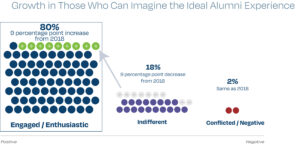 Imagining the Ideal
Imagining the Ideal
Resonance reported another unexpected result: a significant improvement in the percentage of alumni able to imagine an engaging and motivating “ideal” alumni experience. This indicates even greater potential for satisfaction if future improvements are made to their alumni experiences.
In Your Own Words
When asked how the Trinity experience changed their lives, 1,800 alumni provided written comments, often in lengthy paragraphs. Here are themes and quotes from alumni.
Memories
I was immersed with students from all over the country, from different backgrounds.
I was introduced to new environments, passionate instructors, and fresh ideas.
[I met so] many of my friends, and it inspired my sense of adventure.
I gained self-confidence to apply a variety of skills and . . . lifelong tools to lead a fulfilling professional and personal life.
Friendships
I met lifelong friends and business connections.
I’ve traveled the world thanks to Trinity, met some of my best friends.
I met my wife and formed lifelong friendships.
It allowed me to meet many students from many different cultural backgrounds.
Career
It prepared me for medical school.
Everything I do in my career and personal life can be traced back to Trinity.
I had no journalism experience before joining the Tripod. . . . But I immediately fell in love with it.
My teachers brought out the best in me and taught me how to be an educator and curious learner.
It allowed me to obtain a master’s degree in the field of my choice.
Professors opened my mind and supported me in getting a fellowship that changed my life.
Accomplishment
I deepened my faculties of critical thinking and analysis and logic.
I was challenged, rethought my values and beliefs, and became prepared.
It gave me a sense of accomplishment and a community.
It gave me opportunities through the students, faculty, and institution to realize my career.
Personal Growth
It honed my independent thinking. You don’t realize how valuable the experience is until years later.
I was given the space to figure out who I was and what was important to me.
I went on a study-abroad program that exposed me to a career path I didn’t know existed.
It inspired my intellectual curiosity.
Education
I would not have been able to afford to go to college otherwise.
Opportunity and true intellectual engagement.
In A Word
When looking at words used to describe the current alumni experience, the most commonly selected were proud, grateful, happy, and nostalgic—consistent with 2018. Fewer negative words were selected.
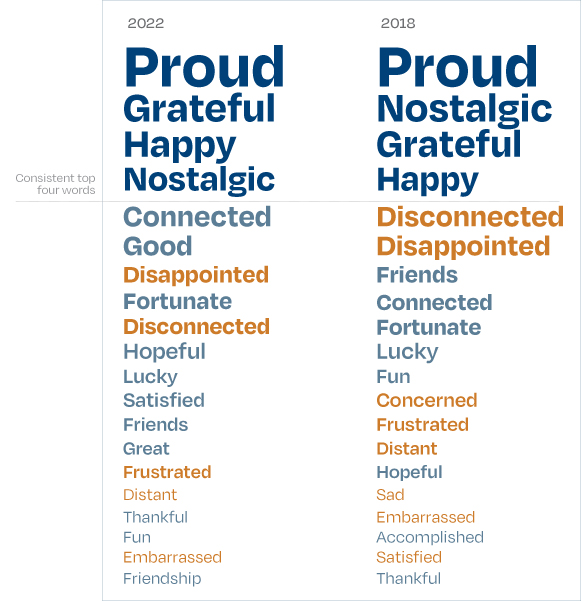
Relevance Today
When asked “How is Trinity relevant today?” alumni pointed to a variety of important roles, including Trinity’s liberal arts education, academic reputation, relationship with Hartford, career preparation, diversity, and graduates.
Overall, 69 percent strongly agreed that “Trinity’s mission is relevant today,” and 26 percent somewhat agreed. This majority persists across all decades of class years.
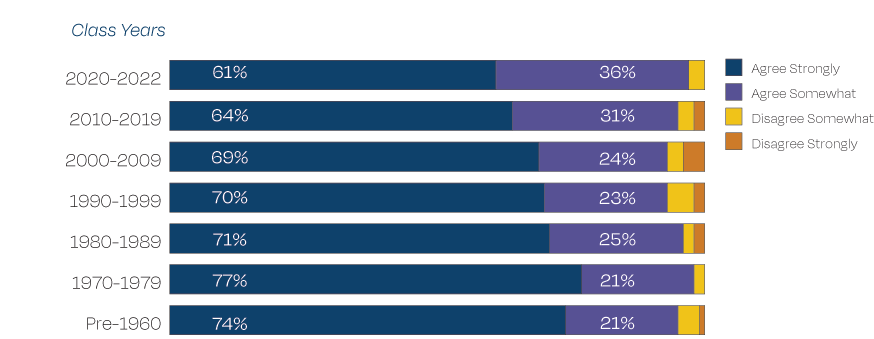
Broadening Support
Analyzing and categorizing more than 10,000 written comments and qualitative data revealed consistent themes with those from 2018—a consistent passion for and pride in their College, friendships, and education. The most prevalent category of these spontaneous comments is “Education” (how alumni feel about the quality), with overwhelmingly positive sentiments. The next largest categories are “Memories,” “People,” and “Connections,” which were more pronounced than in 2018. Alumni also spoke on “Leadership/Administration,” “Career,” “Community,” “Reputation,” and “Attending Trinity.”
Through the comments, there was a clear theme of nostalgia, the desire to reconnect in person, and a deep gratitude for the friendships and memories made on campus. This has affected planning for the yearlong Bicentennial celebration.
“We are grateful to alumni who took the time to answer questions about the Bicentennial,” says Vice President for Strategic Marketing and Communications Hellen Hom-Diamond, co-chair of the Bicentennial Core Planning Committee. “We want to engage as many alumni as we can. Survey data helped to confirm some of the thinking and to shape how we planned.”
With the Bicentennial year in full swing, the focus has been on instilling a community-wide sense of historic pride, such as the retelling of Trinity’s history on the Bicentennial website (www.trincoll.edu/Bicentennial), engaging in communal storytelling, and providing time for reconnection at events such as last summer’s Alumni Bicentennial Celebration. More programming is scheduled throughout the academic year to continue the momentum.
As Trinity approaches the start of the public phase of the All In capital campaign at the end of November, Casey says a deepening a sense of connection will lead to broadening support for the College to continue its mission for years to come.
“The campaign is not just about donors and dollar amounts,” says Casey. “It’s also about believing in our mission and supporting it as one community. Our hope is that philanthropy is not seen as the act of a few donors but rather a statement from the full alumni body that their time at Trinity matters, that the education matters as a beacon for possibilities to change lives. This is reflected in their willingness to contribute philanthropically, but it can also be seen in the tremendous growth in our alumni volunteer ranks, which have nearly quintupled since the last survey.”Casey adds, “The data offer a valuable view into what we’re doing well and where we should focus more energy. We are an organization that learns from listening to what our alumni say and how they express what they are feeling.”
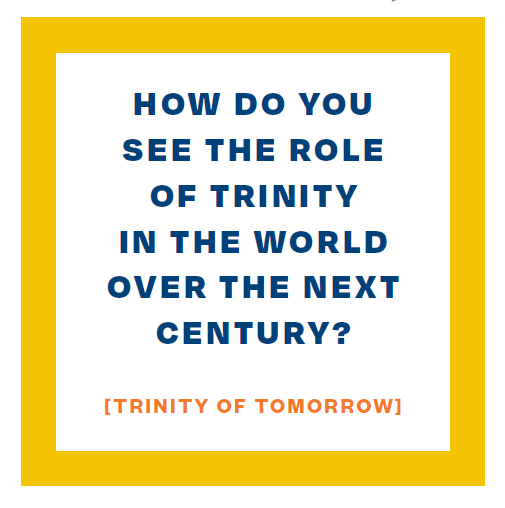
Belief of Impact
Trinity has the opportunity to show the world what the value
of a true liberal arts education can be, but we have to focus
on the educational and intellectual aspects and far less of the political noise.
Significance
Trinity should continue to focus on promoting citizenship; students must realize during their time at the school that they have a commitment to the world around them and figure out how to contribute appropriately.
Accessibility
Higher ed, particularly in the liberal arts, appears to be in crisis and not accessible enough to enough potential students. . . . Trinity needs to prepare students with practical skills not typically associated with a liberal arts education.
Alumni
The continued success of alumni in translating their phenomenal education and critical thinking skills to their work and personal lives exemplifies the success of Trinity.
Liberal Arts
An uncompromising defender of the liberal arts. An institution with the courage to stand for principle and oppose illiberalism. A place where the opening of minds to the world of ideas creates better citizens of their community, nation, and the world.
Truth Seeking
Providing an open setting for free exchange of ideas, integrating the contribution of liberal arts and science, providing training to support intellectual rigor that strives to distinguish between fact and fiction and between propaganda and the exchange of fact-based ideas.
Intellectual Bravery
Medicine, clean water, understanding our fears and what motivates us. . . . The College must continue to open its doors to bright, inquisitive minds, encourage them to be intellectually unafraid, to keep asking questions and challenging assumptions.
Leadership
I hope Trinity educates some fantastic students to tackle the problems in the world and build successful businesses. I also hope it does a better job of integrating with Hartford and revitalizing a city that is in much need of repair.
Innovation
Trinity becoming more advanced and innovative. . . . For example, the Entrepreneurship Center has been a huge plus and something that I would have taken advantage of if I was still a student. I could see the College fostering more student-to-alumni connections, especially in person.
Community
I see Trinity’s most important role over the next century being the creation and export of community and values . . . rooted in things like kindness, problem solving, service to each other, respect and appreciation for differences, bravery, and strength.
Diverse Viewpoints
“I truly wish Trinity would be a pioneer and try to move in a new direction from the other small liberal arts colleges. . . . Encourage and reward debate, teach kids to think for and challenge themselves. Hire professors with a diversity of viewpoints. . . . This kind of work would change the world.
Connectedness
Pivotal. As a small, liberal arts college, Trinity needs to encourage an interdisciplinary approach and bring more balanced minds into the world. . . .Preserve the value of the liberal arts.
De-emphasizing College Rankings
The percentage of alumni who felt that college rankings were “crucial” or “quite a bit important” dropped from 59 in 2018 to 50 percent in 2022. Conversely, the percentage who thought rankings “don’t matter” or only “matter a little” grew from 18 to 25 percent. “This comes at a time when colleges are removing themselves publicly from the ranking systems for reasons such as flawed methodologies. In general, there is a movement away from the significance of rankings as a singular measure of a college’s value,” notes Casey.
